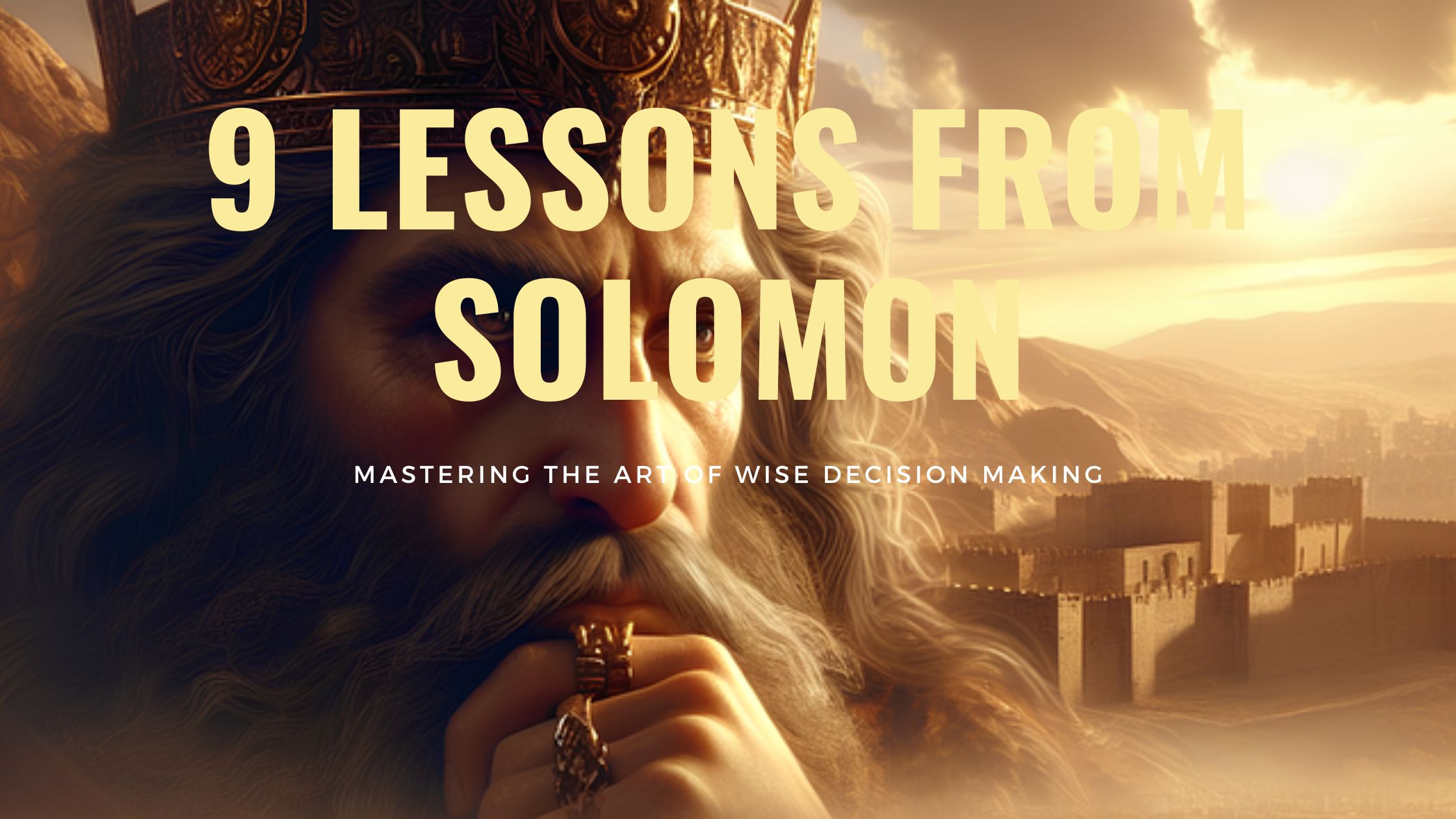Introduction:-
9 Lessons from Solomon: Mastering the Art of Wise Decision Making
In a world filled with choices, from career paths to personal relationships, the ability to make wise decisions is more important than ever. The wisdom of King Solomon, revered for his profound judgment, offers timeless guidance that can help us navigate life’s complexities with confidence and clarity.
In this article, we’ll explore 9 powerful lessons from Solomon that can help you make better decisions in everyday life..
9 Lessons from Solomon

1. Seek Wisdom Above All Else
Solomon’s most famous request was for wisdom, which he received abundantly. In Proverbs 4:7, he states, “The beginning of wisdom is this: Get wisdom. Though it cost all you have, get understanding.”
Lesson: Make seeking wisdom a top priority. Whether it’s through reading, listening to others, or reflecting on experiences, wisdom should always be your first pursuit.
Tip:
- Dedicate time each day to expanding your knowledge. Reading books, listening to podcasts, or having thoughtful conversations with wise mentors can help you build a wealth of wisdom.
2. Consider the Long-Term Impact
Solomon understood that decisions made in the moment can have lasting consequences. In Ecclesiastes 3:1, he writes, “There is a time for everything, and a season for every activity under the heavens.” The key is considering the long-term effects of your choices before acting.
Lesson: Think beyond the immediate result. Will this decision benefit you in the future? Will it align with your long-term goals?
Suggestion:
- Before making major decisions, ask yourself: “How will this affect me and others in 5, 10, or 20 years?” This can help provide clarity and focus.
3. Embrace Humility in Decision Making
As wise as Solomon was, he also knew the importance of humility. In Proverbs 11:2, he said, “When pride comes, then comes disgrace, but with humility comes wisdom.”
Lesson: Acknowledge that you don’t know everything. Being open to advice from others and admitting when you’re unsure can lead to better decisions.
Tip:
- Be open to learning from others. Seek advice from people with more experience in areas where you’re less knowledgeable.
4. Avoid Impulsive Decisions
One of Solomon’s greatest strengths was his ability to stay composed and deliberate, especially in difficult situations. When two women argued over a child in 1 Kings 3:16-28, Solomon proposed to divide the child in half, revealing the true mother’s love. His wisdom came from thinking carefully and not rushing into an emotional reaction.
Lesson: When faced with a tough choice, take a step back. Avoid impulsive reactions and give yourself the time and space to make an informed decision.
Suggestion:
- Practice mindfulness techniques like deep breathing or journaling to calm your mind before making important decisions.
5. Learn from Experience
Solomon’s reign was marked by both great achievements and mistakes. He often reflected on his life experiences, which shaped his wisdom. Ecclesiastes 1:18 states, “For with much wisdom comes much sorrow; the more knowledge, the more grief.” Solomon recognized that learning from both successes and failures was essential for wise decision-making.
Lesson: Use your experiences—both good and bad—to guide your future choices. Learn from your past mistakes and build on your successes.
Tip:
- Keep a journal where you reflect on decisions you’ve made and what you’ve learned from them. This can be an invaluable tool for future decision-making.
6. Trust in God’s Guidance
Solomon often turned to God for guidance in his decisions. In 1 Kings 3:9, Solomon prays, “So give your servant a discerning heart to govern your people and to distinguish between right and wrong.” Solomon believed that divine wisdom was necessary to make the right choices.
Lesson: Trust in a higher power, whether through prayer, meditation, or reflection, to guide you in making wise decisions. Spiritual guidance can help provide clarity in moments of uncertainty.
Suggestion:
- Incorporate regular moments of prayer or reflection into your routine to seek clarity on decisions, big or small.
7. Be Cautious in Friendships and Alliances
Solomon was known for his alliances, especially his marriage to foreign princesses. However, his relationships eventually led him astray, as 1 Kings 11:4 describes: “As Solomon grew old, his wives turned his heart after other gods.” Solomon’s experience teaches us the importance of discerning the influence of those around us.
Lesson: Be cautious about the people you surround yourself with. The influence of your closest relationships can significantly impact your decisions and your values.
Tip:
- Evaluate your friendships regularly. Are they supporting your values and helping you grow, or are they leading you astray? Be mindful of the energy others bring into your life.
8. Use Discernment in Financial Decisions
Throughout his reign, Solomon amassed wealth, but he also emphasized the importance of financial wisdom. In Proverbs 13:11, he states, “Wealth gained hastily will dwindle, but whoever gathers little by little will increase it.” Solomon warned against the temptation of quick wealth and encouraged steady, thoughtful accumulation.
Lesson: Be mindful of how you approach money. Avoid get-rich-quick schemes and instead focus on sustainable financial habits that align with your values..
Suggestion:
- Adopt the principle of “slow and steady wins the race” in your financial planning. Focus on building wealth through steady investments and long-term strategies.
9. Stay Focused on What Truly Matters
Despite his wealth and wisdom, Solomon ultimately realized the futility of earthly pursuits. In Ecclesiastes 12:13, he concludes, “Now all has been heard; here is the conclusion of the matter: Fear God and keep his commandments, for this is the duty of all mankind.”
Lesson: Stay grounded in what matters most—your core values, relationships, and purpose. Don’t let the distractions of life pull you away from what truly brings fulfillment.
Tip:
- Regularly assess your priorities and make sure your decisions align with your core beliefs and what brings you true joy and fulfillment.
Can Solomon’s wisdom help with financial decisions?
Absolutely! Solomon’s wisdom can provide profound guidance when it comes to making financial decisions. His teachings in the Proverbs and Ecclesiastes offer valuable principles that can help you approach money with prudence, discipline, and long-term vision. Here are a few ways Solomon’s wisdom can guide your financial decisions:

1. Steady Accumulation vs. Quick Gains
Solomon often warned against seeking quick, ill-gotten wealth. In Proverbs 13:11, he states:
“Wealth gained hastily will dwindle, but whoever gathers little by little will increase it.”
This teaches us that wealth built over time through steady, disciplined saving and investing is more sustainable than the pursuit of fast, risky financial gains.
Application:
- Slow and Steady: Focus on consistent saving and investing, rather than chasing high-risk, high-reward opportunities that promise quick returns. Long-term financial security comes from incremental growth.
- Budgeting: Follow a budget that helps you save a little each month. Building wealth gradually ensures it lasts longer and grows more effectively.
2. Avoid Debt and Live Within Your Means
Solomon warned against the dangers of debt in many of his proverbs. In Proverbs 22:7, he writes:
“The borrower is slave to the lender.”
Solomon’s advice here is clear—debt can control and limit your financial freedom, and it’s better to live within your means rather than borrowing excessively.
Application:
- Debt Avoidance: Try to pay off any high-interest debts as quickly as possible, and avoid taking on new debt unless it’s absolutely necessary (like for a home or education).
- Living Within Your Means: Control your spending habits, prioritize needs over wants, and set clear financial goals to stay on track.
3. Plan and Budget Wisely
In Proverbs 21:5, Solomon says:
“The plans of the diligent lead to profit as surely as haste leads to poverty.”
Planning and budgeting are crucial to managing your finances. A well-thought-out plan helps you avoid impulsive spending and directs your money toward your long-term goals.
Application:
- Create a Financial Plan: Set a clear financial goal, whether it’s saving for retirement, buying a house, or building an emergency fund. Break your goals into manageable steps, and stay committed to your plan.
- Track Your Spending: Regularly monitor your expenses to make sure they align with your goals and adjust when necessary.
4. Diversify and Invest Wisely
Solomon encouraged wisdom in managing resources, which can also apply to financial investments. In Ecclesiastes 11:2, he advises:
“Invest in seven ventures, yes, in eight; you do not know what disaster may come upon the land.”
This suggests that diversification—spreading out your investments across different asset classes—can protect you from financial loss in times of uncertainty.
Application:
- Diversification: Don’t put all your money into one investment. Spread it across stocks, bonds, real estate, or other assets that can hedge against risk.
- Long-Term Focus: Make decisions with a long-term perspective. Avoid knee-jerk reactions to market fluctuations or short-term trends.
5. Avoid the Trap of Greed
In Proverbs 15:27, Solomon writes:
“The greedy bring ruin to their households, but the one who hates bribes will live.”
Solomon understood that greed can be a destructive force, leading people to make poor financial decisions that can harm their future well-being.
Application:
- Be Content: Focus on what you truly need and practice gratitude. Avoid comparing yourself to others, and don’t chase material wealth at the expense of your happiness or values.
- Ethical Decisions: Make sure that your financial decisions align with your integrity. Avoid schemes or opportunities that promise fast returns but come with unethical implications.
6. Prepare for the Future

In Proverbs 6:6-8, Solomon advises:
“Go to the ant, you sluggard; consider its ways and be wise! It has no commander, no overseer or ruler, yet it stores its provisions in summer and gathers its food at harvest.”
Solomon here teaches the importance of planning for the future and preparing in advance, much like the ant prepares for winter.
Application
- Emergency Fund: Build an emergency fund that covers 3-6 months of living expenses. This financial cushion can protect you during unexpected situations like job loss or medical emergencies.
- Retirement Savings: Contribute regularly to retirement accounts, such as a 401(k) or IRA, to ensure a secure future.
In Summary:
Solomon’s wisdom provides timeless financial guidance:
- Save consistently and avoid debt.
- Plan and budget your finances wisely.
- Diversify your investments and manage risk.
- Be cautious of greed and focus on contentment.
- Prepare for the future and plan ahead.
By incorporating these principles into your financial decision-making, you can build a solid financial foundation that will serve you for years to come. Solomon’s teachings offer a well-rounded approach to managing money with wisdom, foresight, and discipline.
Conclusion: Solomon’s Wisdom for Today
Solomon’s wisdom offers a blueprint for making decisions with clarity, confidence, and discernment. Whether you’re facing a personal, professional, or moral dilemma, these 9 lessons from Solomon can guide you toward wise and thoughtful decisions. By prioritizing wisdom, considering long-term impacts, and embracing humility, you can navigate life’s challenges with greater ease and success.
Remember: Wise decision-making is a skill that can be cultivated over time. Keep learning, stay humble, and trust that wisdom will guide your path.
References
- Proverbs 4:7 – “The beginning of wisdom is this: Get wisdom. Though it cost all you have, get understanding.”
- Ecclesiastes 3:1 – “There is a time for everything, and a season for every activity under the heavens.”
- 1 Kings 3:9 – Solomon’s prayer for wisdom: “So give your servant a discerning heart to govern your people and to distinguish between right and wrong.”
- Proverbs 13:11 – “Wealth gained hastily will dwindle, but whoever gathers little by little will increase it.”
- Ecclesiastes 12:13 – “Fear God and keep his commandments, for this is the duty of all mankind.”
Frequently Asked Questions (FAQs)
1. Why is Solomon considered a symbol of wisdom?
Solomon is revered for his extraordinary wisdom, which he famously requested from God. His ability to make wise decisions, like settling disputes and leading a prosperous kingdom, has made him an enduring symbol of discernment and judgment..
2. How can I apply Solomon’s wisdom in my everyday life?
You can apply Solomon’s wisdom by prioritizing learning, reflecting on past experiences, seeking advice, and considering the long-term impacts of your choices. Cultivating humility, staying grounded in your values, and practicing patience in decision-making are key aspects of this approach.
3. What if I make a bad decision?
Even Solomon made mistakes. The key is to learn from those mistakes, make adjustments, and continue striving to make better choices. Reflecting on your experiences with humility and openness to change is an essential part of wisdom.
4. Can Solomon’s wisdom help with financial decisions?
Yes! Solomon’s teachings on wealth emphasize patience, discernment, and avoiding quick fixes. Instead of seeking immediate wealth, focus on steady, long-term financial planning, which will bring more sustainable success.
5. How do I know if I’m making a wise decision?
Ask yourself questions like: “Does this decision align with my values?” “What are the long-term effects?” “Am I acting with patience or impulsiveness?” If you can answer these questions thoughtfully, it’s a sign you’re on the right path.

